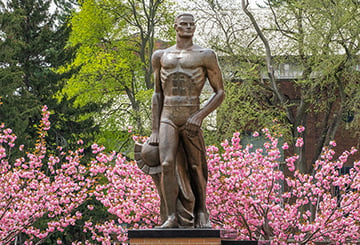If you or someone else is in immediate danger, call or text 911.
You are not alone! Crisis resources are available both on and off campus. The list below is meant to help connect you with the right resources and may not be exhaustive.
Michigan State Resources
- 24/7 MSU Counseling and Psychiatric Services (CAPS) Crisis Counseling: 517-355-8270, Press 1
- 24/7 Employee Assistance Program: 517-355-4506
- MSU Center for Survivors (All services are FREE and confidential)
- 24/7 Interpersonal Violence Crisis Hotline: 517-372-6666
- 24/7 Sexual Assault Healthcare Program (for adults who have been sexually assaulted within the last five days): 517-353-2700
- Crisis Chat: CenterForSurvivors.msu.edu 10am-10 pm 7 days/week
- Safe Place Shelter: Confidential emergency shelter serving survivors of interpersonal violence who are MSU students, faculty, staff (and their spouses/partners/children), as well as survivors in Ingham County.
- 24/7 Campus Health Services Nurse: 517- 353-5557
- Wellness Vending Machines
- Includes free Narcan and reduced-price emergency contraceptives like condoms and Plan-B, COVID-19 test kits and over the counter medications.
- Two locations:
- MSU Union, 49 Abbot Road, 1st floor near the Spartan Bench
- Open to the public Monday – Saturday, 7 a.m. – 6 p.m. and Sunday, 9 a.m. – 6 p.m.
- Open to MSU ID access Monday – Sunday, 6 a.m. – 11 p.m.
- Multicultural Center, 535 N. Shaw Lane, 2nd floor
- Open to the public 7 a.m. – 11 p.m. daily
- MSU Care and Intervention Team (CAIT): Make a referral by visiting ossa.msu.edu/report if an MSU student or employee exhibits any concerning behaviors.
- MSU Department of Police and Public Safety: 517-355-2221
- Office for Civil Rights and Title IX Education and Compliance: 517-355-3960
Local and National Resources
- 24/7/365 National Suicide Prevention Line: call or text 988
- 24/7/365 Substance Abuse and Mental Health Services Administration (SAMHSA) Crisis Text Line: text "HOME" to 741-741
- 24/7/365 LGBTQ+ Crisis Text: text "START" to 678-678
- 24/7/365 Common Ground Resource and Crisis Hub: call 1-800-231-1127
Urgent Care Clinics
Visits to Urgent Care clinics will be at the patient's expense. They generally cost much less than emergency room visits and can usually treat patients more quickly. Urgent care clinics offer medical care, lab, and x-ray for illness and injury that are not life-threatening, such as cuts, sprains, flu, or fever.
- 517-913-6711, 1540 W. Lake Lansing Road, Suite 230, Lansing, MI, Open 7 days a week, 10 am - 6 pm
- 517-339-2100, 1881 W. Grand River, Okemos, MI, Monday - Saturday 8 am - 8 pm, Sunday 10 am - 4 pm
University of Michigan Sparrow East Lansing Urgent Care
- 517-333-6562, 2682 E. Grand River, East Lansing, MI, Open 7 days a week, 8 am - 8 pm
517-999-CARE (2273), 505 N. Clippert St., East Lansing, MI, Open 24 hours
*Does not participate in BCN Student Insurance
Nearest Hospitals
In the event of a medical emergency, call 911 for ambulance transport to the nearest emergency room. Most insurers define a medical emergency as a sudden, unexpected illness or injury that poses an immediate threat to life, limb, or body function. Many insurers will not cover ER visits if the situation is not an emergency.
- McLaren Greater Lansing 2900 Collins Rd, Lansing, MI (3.1 miles from Olin Health Center). McLaren has a 24-hour emergency department and Level III Trauma Center.
- University of Michigan Health- Sparrow 1215 E. Michigan Avenue, Lansing, MI (3.3 miles from Olin Health Center). Sparrow Hospital has a 24-hour emergency department.
Medical Amnesty: See. Call. Stay
Student health and safety are of primary concern at Michigan State University. As such, in cases of significant intoxication or injury as a result of alcohol or other substances (including legal and illicit drugs) that require medical attention, the University encourages individuals to seek medical assistance for themselves or others.
MSU recognizes that students may be reluctant to seek medical assistance out of fear of consequences related to possessing or consuming alcohol or drugs. The purpose of the Medical Amnesty Policy is to reduce the barriers to seeking medical assistance for emergencies and promote community wellbeing and safety. When this occurs, the University honors that care by prioritizing educational and supportive responses.
The University will not pursue disciplinary action through the university student conduct process for violations of the University's alcohol and other drug policies for students who take such action (for themselves or others).
What is Medical Amnesty?
Medical amnesty is exemption from discipline for violations of university drug- or alcohol-use/possession policies for Michigan State University students seeking immediate medical assistance for themselves or on behalf of persons experiencing drug- or alcohol-related emergencies and for MSU students requiring medical attention related to a drug- or alcohol-related emergency. Instead, the students will meet with University personnel and be assigned educational interventions when there is concern regarding the safety of a student in connection to the student's alcohol or drug use.
The full policy, including student eligibility information, can be accessed by clicking this link: MSU Medical Amnesty Policy
Examples of medical emergency include, but are not limited to:
- Alcohol Poisoning/Overdose
- Drug Overdose
- Physical injuries as a result of substance use
Signs of substance overdose include:
- Confusion or stupor
- Vomiting while passed out, not waking up after vomiting, or incoherence while vomiting
- Seizures
- Breathing is slow (less than 8 breaths per minute) or irregular, with 10 seconds or more between breaths
- Weak pulse, very rapid pulse, or very slow pulse
- Cold, clammy, pale or bluish skin
- Loss of consciousness: Inability to awaken a person with loud shouting, or inability of a person to remain awake for more than 2-3 minutes or to carry on a coherent conversation when awake (semi-conscious)
- A person who has lost consciousness and cannot be awakened is in danger of dying. Help is needed immediately.
